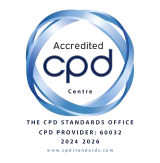

It is estimated that up to 75% of residents in nursing/ care homes in the UK have varying degrees of dysphagia.
Dysphagia is the medical term for swallowing difficulties. Some people with dysphagia have problems swallowing certain foods or liquids, while others can't swallow at all. If not treated properly, Dysphagia can result in:
As well as serious medical complications, dysphagia can also lead to a poorer quality of life for the individual and their family. This may be due to embarrassment and lack of enjoyment of food, which can have profound social consequences. Many of these instances can be avoided if dysphagia is treated timely and appropriately.
This compact course will give you a better awareness of Dysphagia, its causes, risk factors and how to care for those living with Dysphagia.
By the end of the course, candidates will be able to:

We're proud to share that all our E-learning courses are assured by City & Guilds, a global benchmark for excellence. This recognition highlights our commitment to delivering high-quality training that truly makes a difference.

Our courses support lifelong learning and professional growth, accredited by the CPD Certification Service to ensure they meet recognised standards for Continued Professional Development.
Take a closer look at our E-learning experience. Below, you’ll find screenshots from the course alongside a sample certificate you’ll receive upon completion (click to view).
Our courses are designed to be engaging, intuitive, and practical, giving you the tools and confidence to excel in your field.
If you would like to see how our E-learning platform works before purchasing, click on the 'try before you buy' button below and you can try a full length Elearning module, completely free of charge!
Try Before You Buy